- Serbia
Get to know Serbia
- Citizens
Culture and science
Health services
Pension and disability insurance
- Business
Employment
Economy
- Media
- Government
- Contact
Keep in touch
Contact form
Back
Keepin touch
Whether you have a question, comment, suggestion or any problem in the purview of the government, send us your message and we will try to respond as soon as possible. If your problem is not in our purview, we will forward your message to the relevant institution.
Q:
A:
155 European laws must be passed this year
Belgrade,
25 February 2009
Serbian Deputy Prime Minister for EU integration Bozidar Djelic said today that the Serbian parliament must pass at least 155 laws in order to harmonize Serbian legislation with EU standards.
Speaking at the presentation of a report on the implementation of the national EU integration programme at the session of the Serbian parliament’s EU integration committee, Djelic said that Serbia had adopted 29% of the planned harmonized laws between July and December 2008.
He said that this is major progress, considering the fact that only 24% of the necessary legislative work was done during the period from 2003 to 2008.
He said that the plan was to pass 64 laws in the second half of the previous year, of which 49 were adopted by the government and 17 passed by parliament.
He said that during the previous period the ministries of finance, agriculture, infrastructure, justice and environment were the most under pressure regarding the harmonization of legislation.
Djelic stressed that Serbia’s national integration plan is aimed at completing the harmonization of the legal framework in a technical sense by 2012.
He said that the harmonization of the legal framework is one of the ways in which Serbia can make its economy more competitive and the Serbian parliament’s efficiency is of the utmost importance for fulfilling the goals of the integration plan.
He said that he hopes that following the changes made to the rules of procedure parliament will pass laws more quickly, adding that from January 30 Serbia began the unilateral implementation of the Stabilisation and Association Agreement (SAA) and the loss of customs revenues due to its implementation are less than expected.
He stressed that the issue of the removal of visa restrictions is of a technical nature, unlike the question of unblocking the SAA where there are political conditions as well.
Djelic stressed that the Serbian government has adopted an entire set of laws that are required for Serbia’s inclusion on the Schengen “white list”, adding that they will be on the parliament’s agenda for the first regular session in March.
Djelic said that it is expected that the EU will make the decision to include Serbian on the Schengen “white list” in the fourth quarter of this year.
Addressing the press after the Committee session Djelic said that Serbia can obtain more loans, considering the fact that Serbia’s public debt is less than 25% of GDP.
He said that one of the conditions for further financial European integration is a debt no more than 60% of GDP.
He reiterated that Serbia can obtain loans to the amount of €3 billion to €4 billion without jeopardizing the country’s liquidity.
He said that further loans should not be spent on current expenditure such as salaries and pensions but should be reserved for spending on infrastructure projects and support for exporters.
The Serbian government is making every effort to avoid recession, said Djelic, mentioning the set of measures adopted to increase liquidity and investments in economy.
He said that an IMF mission is due to visit Serbia in the middle of March and then all coordinates relating to Serbia’s economic growth and public finances will be established, as well as the precise amount of further support that can be expected from the IMF.
He said that this is major progress, considering the fact that only 24% of the necessary legislative work was done during the period from 2003 to 2008.
He said that the plan was to pass 64 laws in the second half of the previous year, of which 49 were adopted by the government and 17 passed by parliament.
He said that during the previous period the ministries of finance, agriculture, infrastructure, justice and environment were the most under pressure regarding the harmonization of legislation.
Djelic stressed that Serbia’s national integration plan is aimed at completing the harmonization of the legal framework in a technical sense by 2012.
He said that the harmonization of the legal framework is one of the ways in which Serbia can make its economy more competitive and the Serbian parliament’s efficiency is of the utmost importance for fulfilling the goals of the integration plan.
He said that he hopes that following the changes made to the rules of procedure parliament will pass laws more quickly, adding that from January 30 Serbia began the unilateral implementation of the Stabilisation and Association Agreement (SAA) and the loss of customs revenues due to its implementation are less than expected.
He stressed that the issue of the removal of visa restrictions is of a technical nature, unlike the question of unblocking the SAA where there are political conditions as well.
Djelic stressed that the Serbian government has adopted an entire set of laws that are required for Serbia’s inclusion on the Schengen “white list”, adding that they will be on the parliament’s agenda for the first regular session in March.
Djelic said that it is expected that the EU will make the decision to include Serbian on the Schengen “white list” in the fourth quarter of this year.
Addressing the press after the Committee session Djelic said that Serbia can obtain more loans, considering the fact that Serbia’s public debt is less than 25% of GDP.
He said that one of the conditions for further financial European integration is a debt no more than 60% of GDP.
He reiterated that Serbia can obtain loans to the amount of €3 billion to €4 billion without jeopardizing the country’s liquidity.
He said that further loans should not be spent on current expenditure such as salaries and pensions but should be reserved for spending on infrastructure projects and support for exporters.
The Serbian government is making every effort to avoid recession, said Djelic, mentioning the set of measures adopted to increase liquidity and investments in economy.
He said that an IMF mission is due to visit Serbia in the middle of March and then all coordinates relating to Serbia’s economic growth and public finances will be established, as well as the precise amount of further support that can be expected from the IMF.
-
 Belgrade, 4 January 2026
Belgrade, 4 January 2026Violation of UN Charter has become dominant principle of contemporary politics
-
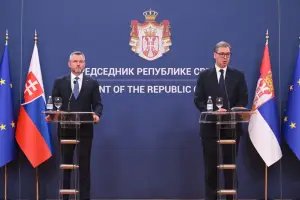 Belgrade, 21 December 2025
Belgrade, 21 December 2025Strengthening cooperation with Slovakia in many areas
-
 Belgrade, 21 December 2025
Belgrade, 21 December 2025President of Slovakia ceremonially welcomed in front of Palace of Serbia
-
 Belgrade, 18 December 2025
Belgrade, 18 December 2025Vučić welcomes President of Georgia in front of Palace of Serbia
-
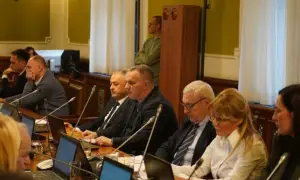 Belgrade, 15 December 2025
Belgrade, 15 December 2025Serbia needs strong, stable education system
-
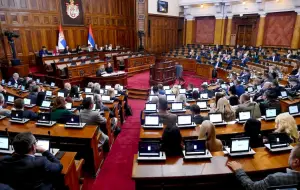 Belgrade, 3 December 2025
Belgrade, 3 December 2025Parliament adopts 2026 budget
-
 Belgrade, 28 November 2025
Belgrade, 28 November 2025Serbian President welcomes President of DR Congo
-
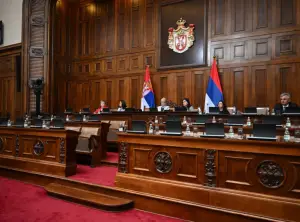 Belgrade, 7 November 2025
Belgrade, 7 November 2025Parliament adopts multiple laws
-
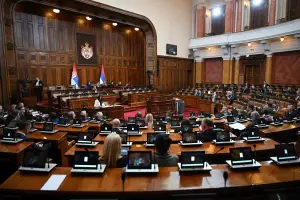 Belgrade, 22 October 2025
Belgrade, 22 October 2025Parliament adopts several laws, ratifies multiple international agreements
-
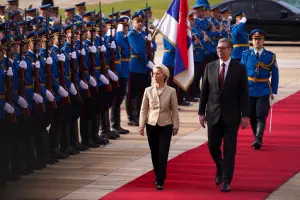 Belgrade, 15 October 2025
Belgrade, 15 October 2025Vučić welcomes Ursula von der Leyen in front of Palace of Serbia


